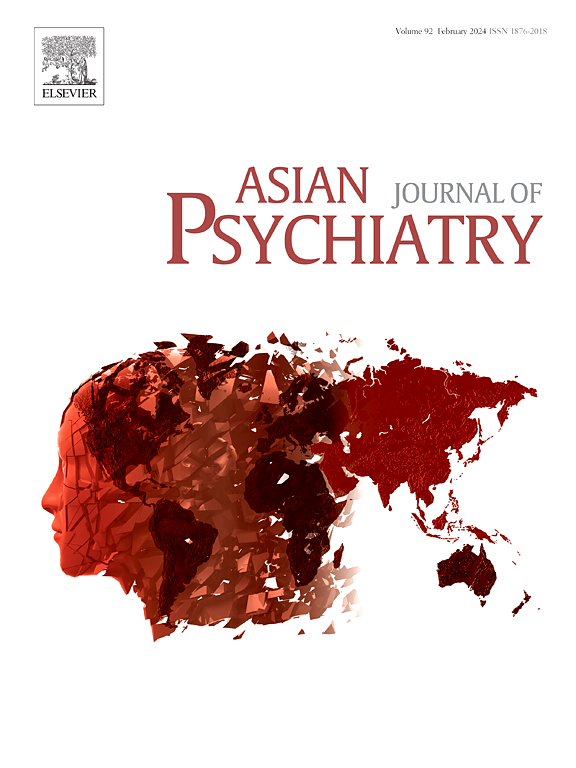Psychometric properties of expanded adverse childhood experiences assessment questionnaire at a wellness centre in India
IF 3.8
4区 医学
Q1 PSYCHIATRY
引用次数: 0
Abstract
The original Adverse Childhood Experiences (ACEs) assessment questionnaire with 10 items has been extensively used to assess and identify associations with long-term negative outcomes in mental health, physical health, and behaviour globally. The past three decades of research has also identified a few additional categories of ACEs beyond the original ten questions. However, there is a gap in the Indian context to establish the psychometric properties of the expanded ACE Assessment Questionnaire and explore associations with mental health parameters.
Objective
This study evaluated the psychometric properties of an expanded ACE Assessment Questionnaire at a wellness centre in India, incorporating culturally relevant modifications to the original 10 items.
Method
An additional six questions (Dangerous neighbourhood, Loss of parent or guardian, Peer bullying or victimization, Peer isolation or rejection, financial difficulty, and Parental fights) based on decades of evidence since the original 10-item questionnaire were added. Internal validity, internal consistency using McDonald’s Omega and item-total correlation followed by principal component analysis were carried out, and confirmatory factor analysis was used to validate the factor structure and model fit indices. Questions which did not contribute to the construct were removed and predictive analysis was conducted using linear regression to predict depression and anxiety using the expanded questionnaire.
Result
Two questions (incarceration in the family from the original 10-items questionnaire and loss of parent or guardian from the additional six questions) were removed since they did not contribute significantly to the psychometric properties. The results of the remaining 14-item questionnaire confirm that it is reliable (McDonald’s Omega) and meets content validity criteria based on three-factor structure (Factor 1 - Childhood Maltreatment, Factor 2 - Resource Scarcity & Environmental Distress, Factor 3 - Household Challenges).
Conclusion
The findings highlight that additional questions are relevant in the Indian context, and the revised 14-item questionnaire has better psychometric properties while maintaining its conceptual scope in that context. The findings validate these modifications in larger, representative Indian samples to ensure the questionnaire's reliability in assessing childhood adversity and its association with long-term effects.
在印度的一个健康中心扩展不良童年经历评估问卷的心理测量特性
最初的童年不良经历(ace)评估问卷包含10个项目,已被广泛用于评估和确定与全球心理健康、身体健康和行为的长期负面结果的关联。在过去三十年的研究中,除了最初的十个问题之外,还发现了一些额外的王牌类别。然而,在印度的背景下,建立扩大的ACE评估问卷的心理测量特性和探索与心理健康参数的关系存在差距。目的:本研究评估了印度一家健康中心扩充的ACE评估问卷的心理测量特性,并对原来的10个项目进行了与文化相关的修改。方法增加六个问题(危险社区,失去父母或监护人,同伴欺凌或受害,同伴孤立或拒绝,经济困难,父母打架),这是基于最初的10个问题的调查问卷增加了几十年的证据。采用麦当劳Omega进行内部效度、内部一致性和项目-总量相关性分析,然后进行主成分分析,并采用验证性因子分析对因子结构和模型拟合指标进行验证。剔除对构建无贡献的问题,采用线性回归进行预测分析,利用扩展问卷预测抑郁和焦虑。结果2个问题(原问卷10个题项中的家庭监禁情况和附加的6个题项中的失去父母或监护人)由于对心理测量特性没有显著影响而被删除。其余14项问卷的结果证实其是可靠的(麦当劳欧米茄),并符合基于三因素结构的内容效度标准(因素1 -儿童虐待,因素2 -资源稀缺&;环境困扰,因素3 -家庭挑战)。结论研究结果表明,在印度背景下,增加的问题是相关的,修订后的14项问卷在保持其概念范围的同时具有更好的心理测量特性。研究结果在更大的、有代表性的印度样本中验证了这些修改,以确保问卷在评估童年逆境及其与长期影响的关系方面的可靠性。
本文章由计算机程序翻译,如有差异,请以英文原文为准。
求助全文
约1分钟内获得全文
求助全文
来源期刊

Asian journal of psychiatry
Medicine-Psychiatry and Mental Health
CiteScore
12.70
自引率
5.30%
发文量
297
审稿时长
35 days
期刊介绍:
The Asian Journal of Psychiatry serves as a comprehensive resource for psychiatrists, mental health clinicians, neurologists, physicians, mental health students, and policymakers. Its goal is to facilitate the exchange of research findings and clinical practices between Asia and the global community. The journal focuses on psychiatric research relevant to Asia, covering preclinical, clinical, service system, and policy development topics. It also highlights the socio-cultural diversity of the region in relation to mental health.
 求助内容:
求助内容: 应助结果提醒方式:
应助结果提醒方式:


